Understanding Depression in Older Children and Teens
Understanding Depression in Older Children and Teens
When your child is facing depression, it’s hard to know where to turn. This course, led by Dr. Maya Bristow Klein, is your go-to guide for understanding what your child is going through and how you can help. You’ll learn how to spot the early signs of depression, communicate effectively with your child, and create a supportive home environment that fosters healing. Plus, we’ll cover the ins and outs of medication, alternative treatments, and what really lies beneath the surface of depression. With step-by-step guidance, resources, worksheets, and real-world strategies, you’ll gain the confidence and knowledge to be the support your child needs as you both move toward a brighter path forward.
When Depression Weighs Heavy, We Help Light the Way
As a parent, seeing your child struggle with depression is heart-wrenching. You’ve tried everything—talking, listening, reading articles online—but nothing seems to help, and you feel:
- Overwhelmed and isolated
- Unsure how to communicate
- Stuck second-guessing
- Frustrated with conflicting advice
At Pathformers, we know depression can feel like navigating an unfamiliar road full of twists and turns. This is exactly why we created our course, “Understanding Depression in Older Children and Teens.” With the guidance of an experienced psychologist, you’ll find the practical strategies and advice you need to steer your child to a brighter future.

Your Path Forward
This course is designed to make complex information feel clear and manageable, giving you the confidence to support your child without feeling overwhelmed.
Here’s how this course can help:
Spotting the Signs
Learn to recognize the subtle signs of depression in older kids and teens, including the often-missed indicators that can make a big difference.
Talking That Connects
Learn to recognize the subtle signs of depression in older kids and teens, including the often-missed indicators that can make a big difference.
Creating a Healing Space at Home
Find out how to set up a supportive environment that eases stress and promotes your child’s emotional well-being.
Medication and Alternatives Explained
Get a balanced look at medication options and alternatives, so you can make informed decisions about what’s best for your child.
Understanding What’s Beneath the Surface
Dive into the science beyond the “chemical imbalance” theory and uncover deeper influences on your child’s mental health.
Facing Your Own Concerns
Get real, compassionate advice that speaks directly to your worries as a parent, giving you practical steps you can take right now.
Depression doesn’t just affect your child. It touches every aspect of family life. This course offers you evidence-based information and resources you need to help your child feel supported, connected, and heard so your whole family can heal and move forward together.
Parents Like You Trust Pathformers
A Look Inside the Course
Each module starts with a video lesson led by Dr. Maya Bristow Klein that cuts through the noise, making complex topics feel manageable. Plus, you’ll get resources and worksheets that reinforce what you’ve learned, making it easy to put these insights into action.
Here’s a peek at the modules:
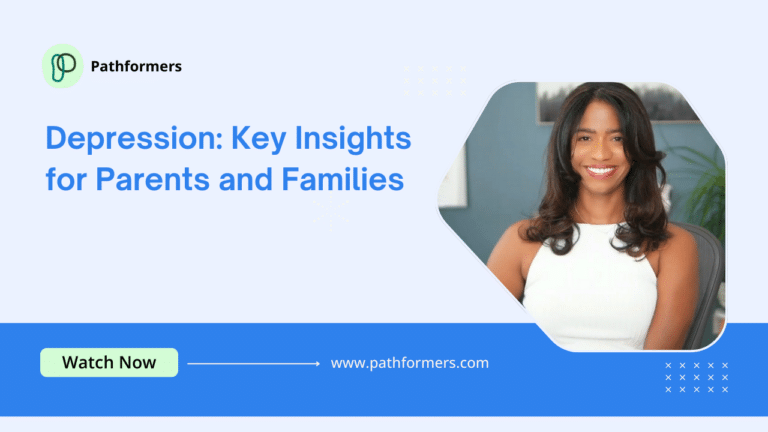
Depression: Key Insights for Parents and Families
Get the basics on childhood depression and what it means for your family. We’ll break down the essentials so you can feel more prepared and less overwhelmed.
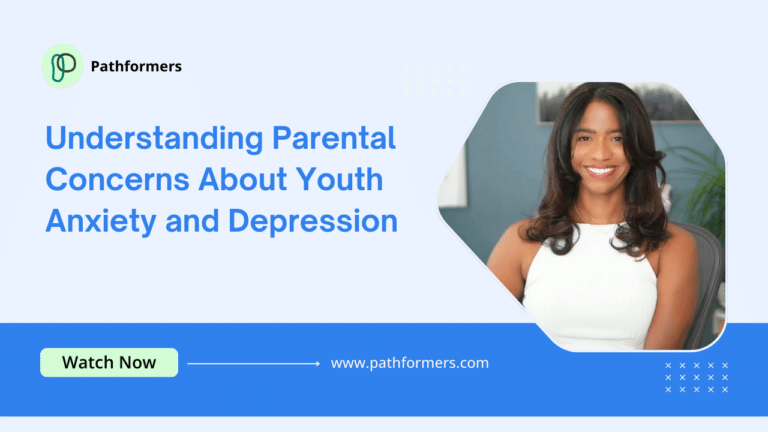
Understanding Parental Concerns About Youth Anxiety and Depression
We know you have questions—this module addresses the common concerns parents have about youth anxiety and depression with honest, practical advice.

How Early Experiences Shape Depression
Early life can have a big impact on mental health. Learn how your child’s early experiences may shape their emotional well-being and how you can help.
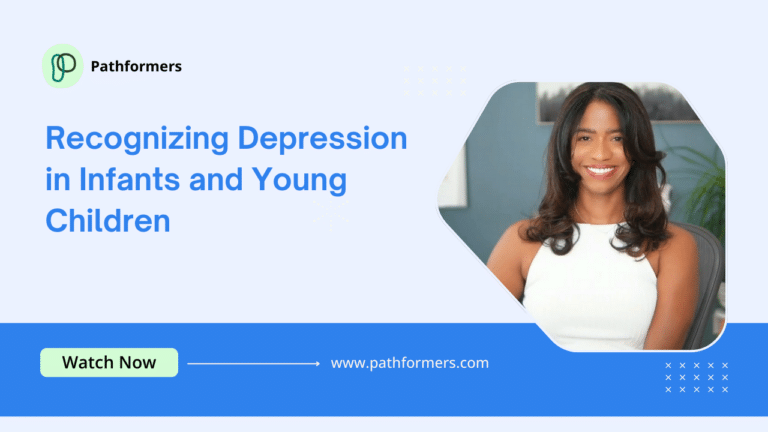
Recognizing depression in infants and youth children
Spotting depression in young kids can be tough. This module helps you recognize the signs and understand what steps you can take to support them.

How toddlerhood shapes future mental well-being
Those early toddler years are more important than you might think. Discover how early development plays a role in shaping your child’s future mental health.
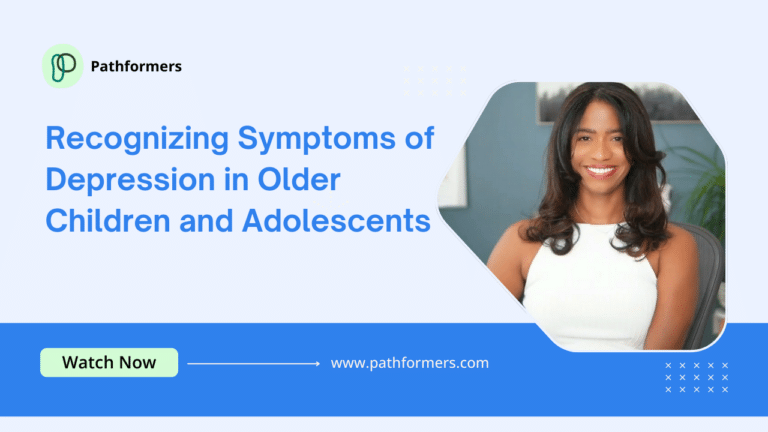
Recognizing depression in order children and adolescents
Understand how depression shows up in older kids and teens. We’ll help you identify the signs so you can step in early and provide the support they need.

Understanding why my teen is Depressed
Depression in teens can be complicated. This module dives into the “why” behind your teen’s struggles to help you better connect and support them.

Understanding the Chemical Imbalance Theory
You’ve heard about the “chemical imbalance” theory—now learn what it really means for your child and how it fits into their mental health story.

Exploring Perspectives on Depression beyond the Chemical Imbalance Theory
Go beyond the standard explanations of depression to explore other factors that influence your child’s mental health and well-being.

Rethinking traditional views on depression
It’s time to challenge the old ways of thinking about depression. This module offers new perspectives that can change how you approach your child’s needs.

Considering Medication for childhood depression
Thinking about medication? We’ll walk you through the pros and cons, so you feel informed and confident about whatever choice you make.

Guiding your child through medication discontinuation
Whether starting, changing, or stopping medication, this module provides guidance on how to navigate this process with care and confidence.

Impact of Depression on Daily Life
Depression doesn’t just impact feelings—it affects everything. Learn how it touches your child’s daily life and find ways to help them cope.
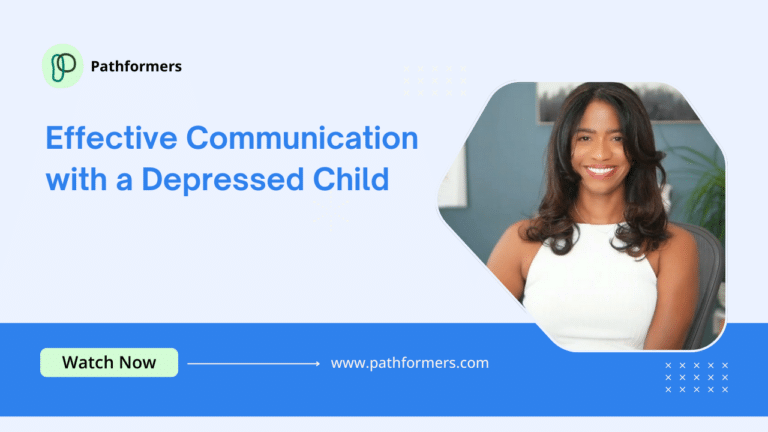
Effective Communication with a Depressed child
Talking to your child about depression can be tough. Get tips on how to communicate in a way that builds trust and connection.

Supporting Your Depressed Child at Home
Creating a supportive home environment can make a huge difference. This module shares practical tips to help your child feel safe, heard, and supported.

When to Seek Professional Help
It can be hard to know when it’s time to get outside support. This module helps you identify the signs that professional help may be needed and provides guidance on taking that next step with confidence.
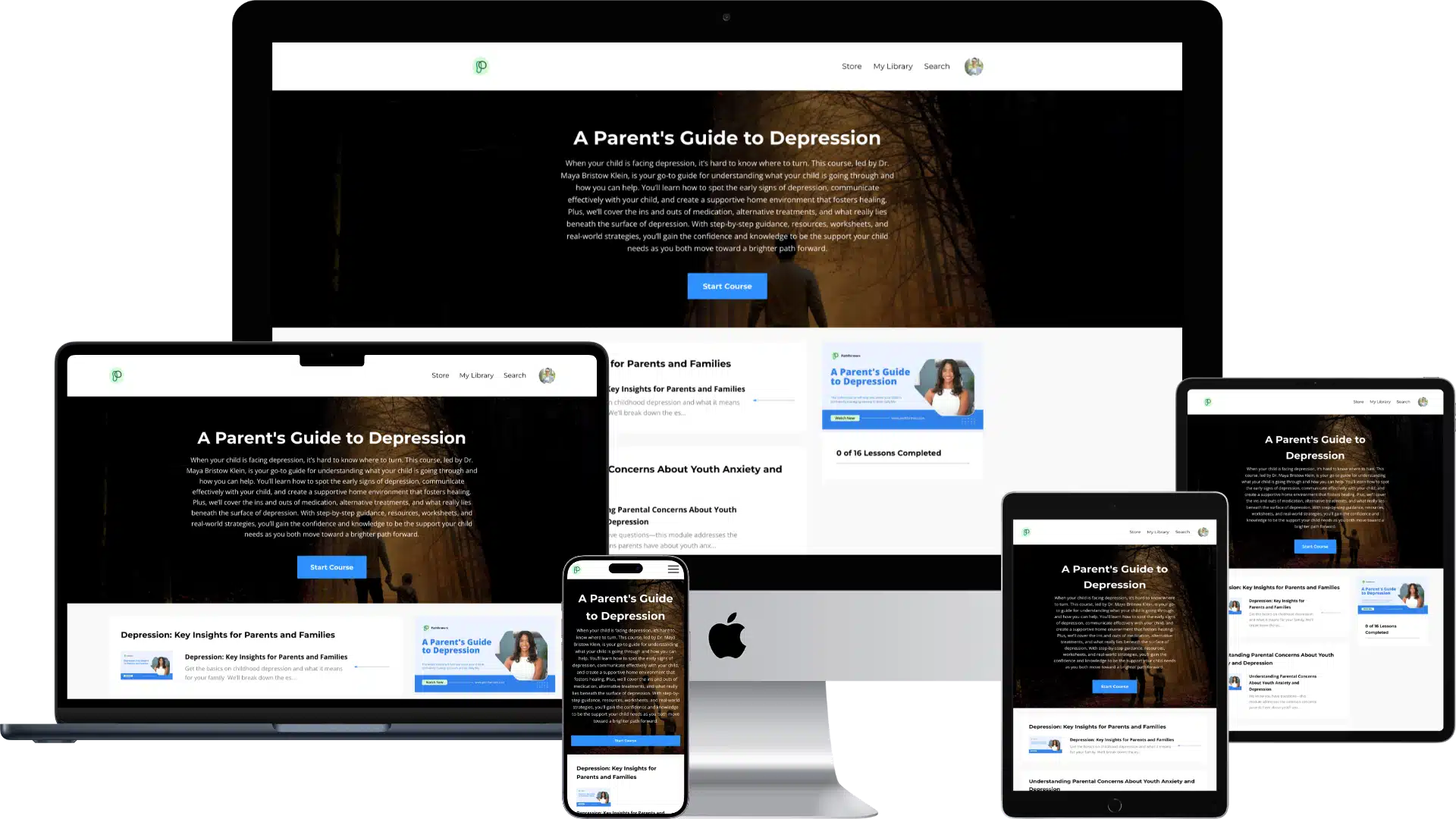
Let’s Take the Next Step Together
Supporting your child through depression isn’t easy, but you don’t have to do it on your own. With practical advice, experienced guidance, and helpful tools, this course will leave you feeling encouraged, informed, and confident about helping your child overcome this challenging time.
Frequently Asked Questions
What will I learn from the “A Parent’s Guide to Depression” course?
You’ll learn to recognize symptoms of childhood and adolescent depression, explore treatment options, and provide emotional and practical support at home. The course also covers resilience-building strategies and improving communication with your child.
Who is this course designed for?
This course is for parents and caregivers who want to understand and support their children through depression, offering evidence-based guidance and practical tools for recovery.
How can I help my child at home if they’re dealing with depression?
The course offers strategies for creating a supportive home environment, fostering open communication, and providing emotional support to help your child cope with depression.
What are the early signs of depression in children?
You’ll learn to spot early signs like mood shifts, behavior changes, and sleep disturbances in infants, children, and adolescents.
When should I seek professional help for my child’s depression?
The course explains how to recognize when professional help is needed and offers guidance on getting the right support.
What Are the Comorbidities of Childhood Depression?
Childhood depression, also known as depressive disorders in children and adolescents, often coexists with other mental health conditions. These comorbidities can intensify challenges and necessitate an integrated approach for effective management. Below, we explore the most common comorbidities, their implications, and strategies for support.
What Is Comorbidity in Childhood Depression?
Comorbidity refers to the presence of one or more additional disorders alongside depression in children and adolescents. This coexistence complicates diagnosis and treatment, impacting the mental health and overall well-being of the affected individual.
What Are the Most Common Comorbidities of Childhood Depression?
1. Anxiety Disorders
- Overview: Includes generalized anxiety disorder, social anxiety, and panic disorder.
- Prevalence: Many children with depression also exhibit symptoms of anxiety, creating a complex clinical picture.
- Impact: Heightened emotional distress, impaired functioning, and challenges in school and social settings.
2. Attention-Deficit/Hyperactivity Disorder (ADHD)
- Overview: Symptoms of hyperactivity, impulsivity, and inattention often overlap with depression.
- Prevalence: Studies estimate that 13% to 27% of children with ADHD also experience depression.
- Impact: Requires tailored treatment strategies to address both conditions effectively.
3. Conduct Disorder
- Overview: Characterized by aggressive or antisocial behaviors.
- Impact: Coexisting conduct disorder can exacerbate behavioral issues, increasing academic and social difficulties.
4. Substance Use Disorders
- Overview: Adolescents with depression are at higher risk for substance use disorders.
- Impact: Substance use worsens depressive symptoms and hinders recovery.
5. Learning Disabilities
- Overview: Conditions like dyslexia often coexist with depression.
- Impact: Struggles in school contribute to low self-esteem, exacerbating depressive symptoms.
What Are the Risk Factors for Comorbidity in Childhood Depression?
Common risk factors include:
- Family History: A genetic predisposition to depression or anxiety.
- Stressful Life Events: Trauma, abuse, or significant life changes.
- Developmental Challenges: Cognitive, emotional, or social difficulties that increase vulnerability.
How Does Comorbidity Affect the Treatment of Childhood Depression?
Comorbidities often require:
- Integrated Approach: Simultaneously addressing depression and co-occurring disorders.
- Therapeutic Strategies: Adapting interventions like cognitive-behavioral therapy (CBT) to manage overlapping symptoms.
- Monitoring and Adjustment: Regular evaluations to assess progress and modify treatment plans as needed.
How Can Parents and Caregivers Support Children with Comorbid Depression?
Parents and caregivers play a vital role in supporting children with depression and comorbid conditions. Key steps include:
- Seek Professional Help: Work with mental health specialists trained in child and adolescent care.
- Encourage Open Communication: Foster a safe, non-judgmental environment for children to share their feelings.
- Promote Healthy Habits: Ensure routines include sufficient sleep, regular exercise, and a balanced diet.
- Stay Informed: Learn about your child’s specific comorbidities to better understand and meet their needs.
What Are the Next Steps for Managing Comorbidities in Childhood Depression?
- Early Diagnosis: Timely identification improves outcomes.
- Comprehensive Treatment Plans: Collaborate with professionals to tailor strategies to your child’s unique needs.
- Consistent Support: Maintain a supportive home environment and prioritize regular check-ins with healthcare providers.
For more resources and expert guidance on managing childhood depression and its comorbidities, explore Pathformers’ educational materials and advocacy programs. Together, we can provide the support children need to thrive.
Help Steer Your Child’s Development
Subscribe to our newsletter for exclusive video updates, expert parenting strategies, and the latest insights in child development and mental health.




